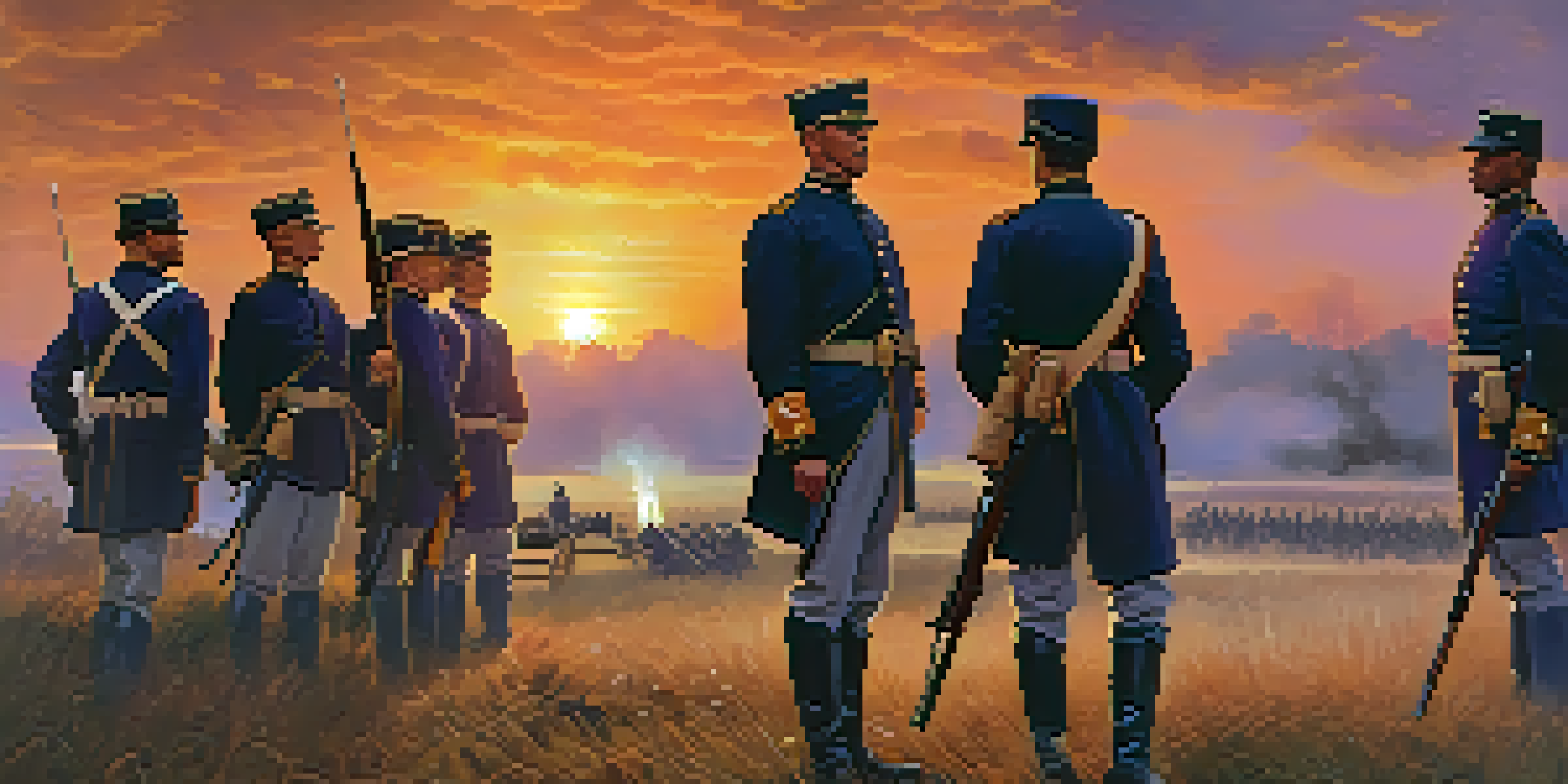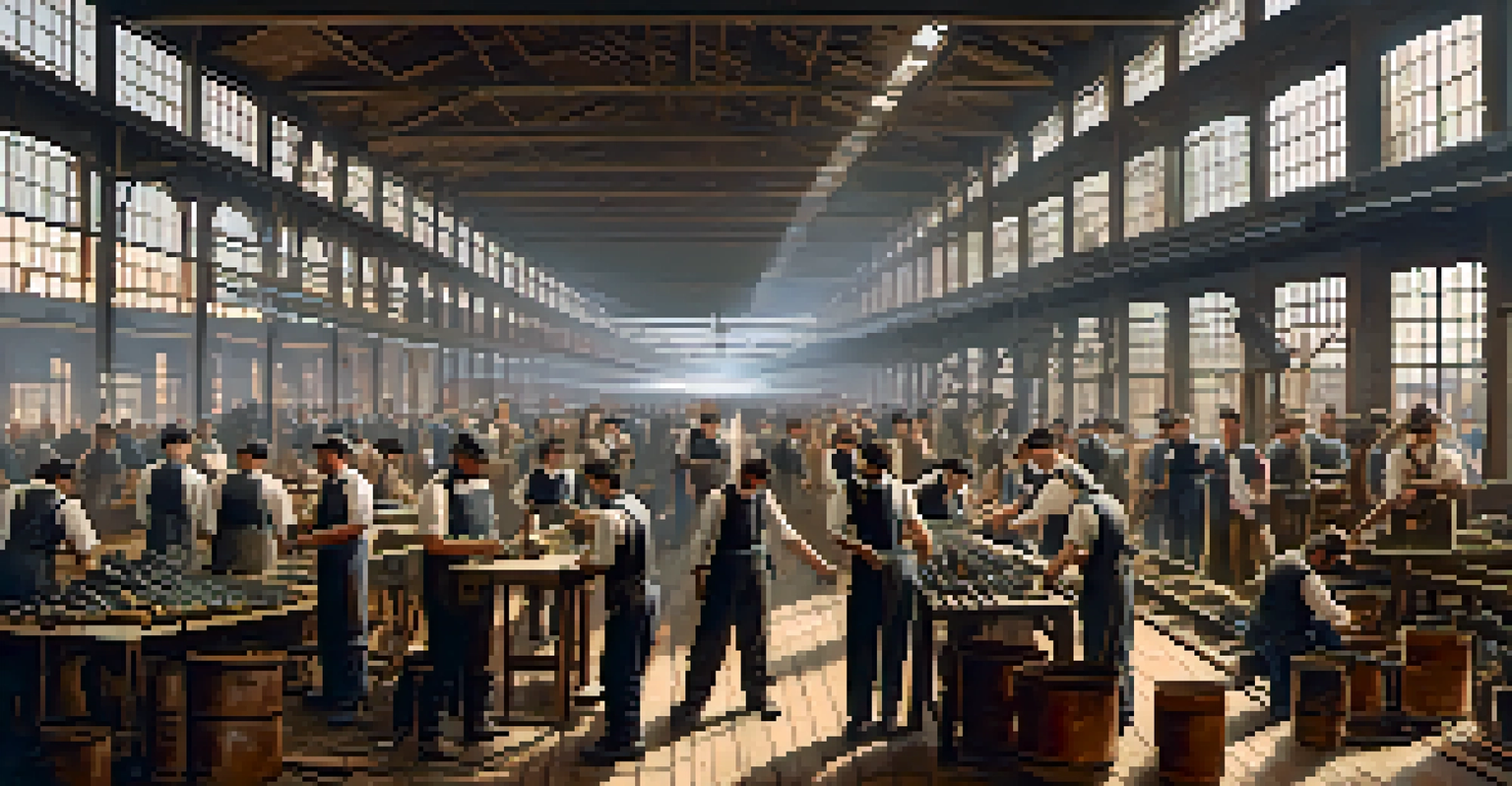The Role of Illinois in the Civil War: A Historical Overview

Illinois: A Crucial State in the Civil War
Illinois was a key state during the Civil War, both geographically and strategically. Positioned in the heart of the Midwest, it served as a critical supply route for Union forces. The state's population and resources made it a vital contributor to the Union's war effort.
A house divided against itself cannot stand.
With a population of over 1.5 million at the time, Illinois had one of the largest volunteer armies. Over 250,000 men from Illinois enlisted, showcasing the state's commitment to the Union cause. This significant mobilization not only bolstered Union ranks but also reflected the strong anti-slavery sentiment among many Illinois residents.
The state's involvement in the war extended beyond troop contributions; it also provided essential supplies and munitions. Factories in cities like Chicago produced weapons and other materials crucial for the Union's success. Illinois truly played a multifaceted role in the Civil War.
The Political Landscape in Illinois
The political climate in Illinois leading up to the Civil War was charged and complex. Abolitionist movements were gaining momentum, with many residents advocating for the end of slavery. This growing sentiment contributed to Illinois being a stronghold for the Republican Party, which opposed the expansion of slavery.

Abraham Lincoln, a native of Illinois, became the face of this political shift. His election as the first Republican president in 1860 was a tipping point in the country’s history. Lincoln's leadership during the Civil War was pivotal, and his ties to Illinois solidified the state's political significance during this tumultuous period.
Illinois: A Key Union Contributor
Illinois played a crucial role in the Civil War by providing over 250,000 soldiers and essential supplies, significantly supporting the Union's efforts.
The political divisions within Illinois mirrored those of the nation, with some residents supporting the Confederacy. This internal conflict added layers of complexity to the state's role in the war, as residents grappled with issues of loyalty and morality.
The Chicago Contribution: A Hub for Supplies
Chicago emerged as a major logistical hub during the Civil War, providing vital supplies to Union troops. The city's extensive rail network allowed for efficient transportation of troops and materials. This strategic advantage meant that Chicago played a central role in the war effort.
The great thing about the Civil War is that it reminds us of the enduring power of the human spirit.
Local businesses and manufacturers ramped up production to meet the needs of the military. From uniforms to weapons, Chicago's factories were buzzing with activity. This surge in industrial output not only supported the war but also fueled the city's economic growth during and after the conflict.
Moreover, Chicago hosted several military camps and hospitals, becoming a gathering point for soldiers. The city's commitment to the Union was evident in its support for the troops, both on the battlefield and at home.
The Role of Illinois Soldiers in Key Battles
Illinois soldiers participated in many significant battles during the Civil War, showcasing their bravery and dedication. Notably, troops from Illinois fought at the Battle of Shiloh, where they faced intense combat and heavy casualties. Their resilience in the face of adversity became a hallmark of the state's military reputation.
The 8th Illinois Cavalry, along with other regiments, distinguished themselves in various campaigns, including the Siege of Vicksburg. These efforts not only contributed to Union victories but also highlighted the strategic importance of Illinois troops on the battlefield.
Chicago's Strategic Importance
Chicago emerged as a major logistical hub, with its extensive rail network facilitating the efficient movement of troops and supplies for the Union.
Many Illinois soldiers received commendations for their bravery, furthering the state's legacy in the annals of Civil War history. Their sacrifices and valor are remembered as a testament to Illinois' commitment to preserving the Union.
Civilian Life and the War's Impact on Illinois
The Civil War profoundly affected civilian life in Illinois, transforming communities and economies. Families were often separated as men enlisted, leaving women and children to manage farms and businesses. This shift not only challenged traditional roles but also empowered many women to take on new responsibilities.
Additionally, the war sparked a wave of patriotism, leading to numerous fundraising efforts for the troops. Illinois residents organized fairs, concerts, and rallies to support soldiers, demonstrating a strong sense of community and solidarity. This collective effort helped sustain morale during difficult times.
However, the war also brought hardship, as families faced the realities of loss and economic strain. The emotional and financial toll of the war left lasting scars on many Illinois communities, shaping the state's post-war recovery.
The Legacy of Illinois in the Civil War
The legacy of Illinois in the Civil War is one marked by valor and sacrifice. The contributions of Illinois soldiers, politicians, and civilians played a vital role in shaping the outcome of the war. This legacy continues to be honored through memorials, museums, and historical sites across the state.
The preservation of history in Illinois is evident in places like the Lincoln Home National Historic Site in Springfield. These sites serve as reminders of the state's critical role and the sacrifices made during the Civil War. They also foster a deeper understanding of the complexities surrounding this pivotal period.
Legacy of Valor and Sacrifice
The sacrifices and bravery of Illinois soldiers during key battles have left a lasting legacy that continues to be honored and remembered across the state.
Furthermore, the lessons learned from Illinois' involvement in the Civil War resonate today, emphasizing the importance of unity and resilience in the face of division. The state's history during this time serves as a powerful example of the enduring spirit of its people.
Conclusion: Illinois' Enduring Civil War Influence
In conclusion, Illinois' role in the Civil War was significant and multifaceted, influencing both the war's outcome and the state's future. From its strategic position to the courageous involvement of its soldiers, Illinois stands out as a key player in this historical conflict. The impact of the war is still felt in Illinois today, shaping its identity and values.
The contributions of Illinois residents, both military and civilian, highlight the importance of community engagement and support during times of crisis. This spirit of collaboration can be seen in modern-day Illinois as well, where residents continue to come together for common causes.

Ultimately, understanding Illinois' history in the Civil War enriches our appreciation of the past and its relevance to ongoing discussions about unity, freedom, and the challenges we face as a society.